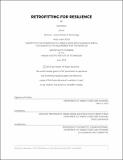Retrofitting for resilience
Author(s)
Nidam, Yael.
Download1140447435-MIT.pdf (18.61Mb)
Other Contributors
Massachusetts Institute of Technology. Department of Urban Studies and Planning.
Advisor
Brent D Ryan.
Terms of use
Metadata
Show full item recordAbstract
This thesis explores the incentives and barriers to retrofit single-family and small multi-family homes in Boston, in response to the city's declared goal of reaching carbon neutrality by 2050 while protecting citizens from extreme weather events induced by climate change. Considering small properties do not report their energy consumption, little is known about a sector that accounts for 20% of the city's carbon emissions. The federal, state and local government offer a myriad of incentive programs to improve the energy efficiency of these homes, yet uptake on those opportunities is low and inconsistent with the rate needed to achieve the city's mitigation and adaptation goals. Recent technological advancements enable the study of these buildings from the ground up, enabling urban scale insights from the study of individual buildings' performance. The methodology to develop Urban Building Energy Models (UBEM) was developed by the Sustainable Design Lab at MIT in 2016, to estimate citywide energy demand loads down to the individual building level. Utilizing an existing UBEM for two neighborhoods in Boston, this thesis explores the impact of energy savings and government incentives on households' ability to participate in retrofit programs, to uncover unmet needs and form recommendations to accelerate retrofit implementation. The novelty of this research is not in developing the model, but in exploring a new application of an existing model. Results show that while implementation of retrofits is not financially beneficial for every household, there is a substantial gap between the number of households who can potentially benefit from these incentives and the current participation rate. Interviews with policy designers and architects working on retrofit implementation in Boston reveal additional barriers to explain this gap. Recommendations for quick fixes include better visualization tools to communicate the specificity of applicable programs at the individual building scale and in response to the householder needs, investment in programs to bolster communities' organization capacity and expediting and streamlining the process to make it easier to access. This study demonstrates the potential of UBEM to inform public policy and increase citizen access to government benefits, as part of a global effort to enhance the transparency and the efficacy of governance through digital interfaces.
Description
This electronic version was submitted by the student author. The certified thesis is available in the Institute Archives and Special Collections. Thesis: M.C.P., Massachusetts Institute of Technology, Department of Urban Studies and Planning, 2019 Cataloged from student-submitted PDF version of thesis. Includes bibliographical references (pages 60-62).
Date issued
2019Department
Massachusetts Institute of Technology. Department of Urban Studies and PlanningPublisher
Massachusetts Institute of Technology
Keywords
Urban Studies and Planning.